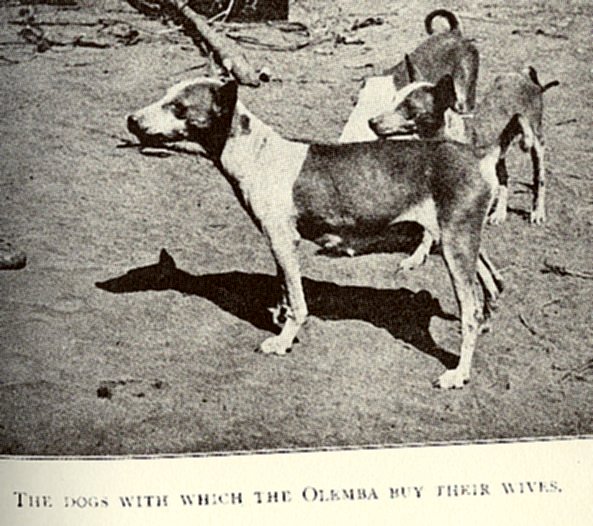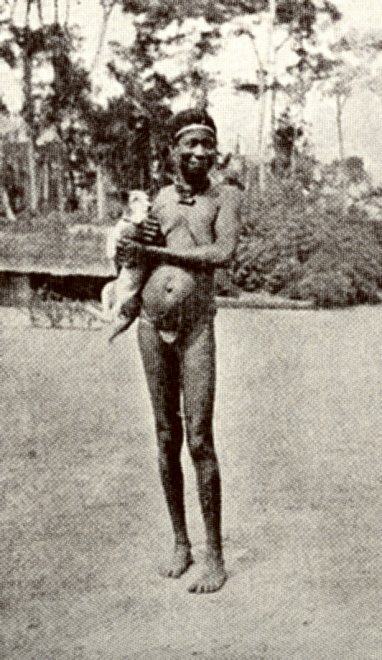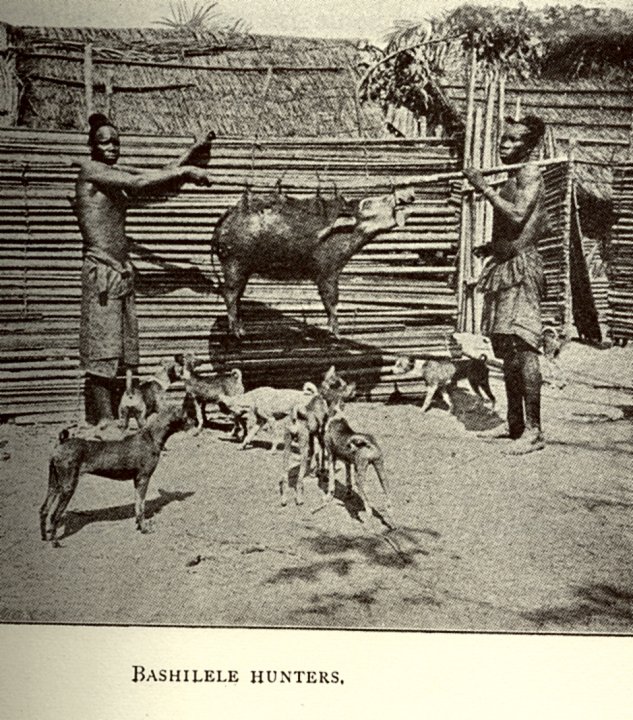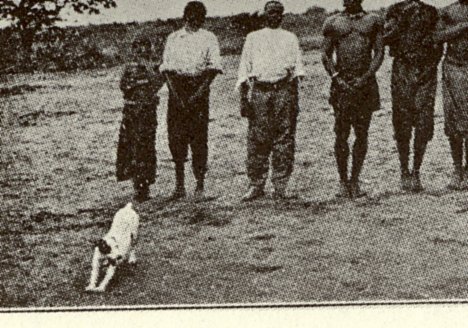PHOTOS & EXCERPTS
FROM
"LAND & PEOPLES OF THE KASAI"
By: M. W. Hilton-Simpson, F.R.G.S., F.Z.S., F.R.A.I
Published by: Negro Universities Press, New York, USA, 1956
![]()
In 1911, M.W. Hilton-Simpson published an account of "... a two years' journey among the cannibals of the equatorial forest and other savage tribes of the South-Western Congo." The adventures recounted in the book actually took place in 1907-1909 - nearly 30 years prior to the first successful exportations of Basenjis from the Congo to Great Britain (click HERE to see photos from Mrs. Burn's article regarding the 1930's imports). The following photos are unretouched but have been adjusted for contrast.

This photo of native dogs at page 162 is captioned:
"The Dogs With Which the Olemba buy their wives."
![]()

From page 173, a photo of a young woman of the
Akela tribe, holding a Basenji puppy.
![]()

Since several of the dogs are standing so close together, this photo from page 331 was
hard to scan in a manner that did justice to it. It shows Bashilele hunters with their
Basenjis (very nice ears and tails!) displaying the results of the
day's hunt - a large wild boar.
![]()

This photo on page 339 has been enlarged significantly.
The original shows a long line of the author's porters from the Kwilu.
I noticed a fascinating interloper - one of the
author's FOX TERRIERS that accompanied him on the trip.
For more on Fox Terriers in the Congo in 1907-1909, see the final text
excerpt entry below...
![]()
TEXT EXCERPTS RELATING TO BASENJIS
(& Fox Terriers !)
![]()
From pages 258-259:
"The Bayanzi tribe are cannibals; the Bapende, to which Benga [a 'hired boy' on the trip] belonged, are not; and we once overheard the following conversation on the subject of cannibalism. "You Bapende," scornfully remarked Buya [another hired boy], "you kill dogs to eat them." "Well," replied Benga, "you Bayanzi can't talk; you eat men." This remark caused an outburts of indignation on the part of the little cannibal. "It is all very well to eat your enemies when you have killed them in battle -- is not that quite a natural thing to do? -- but no decent person would think of eating his friend. You Bapende think nothing of eating dogs, the greatest friend of man." Buya, I am afraid, was so disgusted at the idea of eating dogs, that he flavoured his remarks about the Bapende tribe with a good many expressions such as a European lad of his age might well be expected not to know the use of."
From pages 300-301:
"We first noticed at Bwabwa rather a curious thing about the Bakongo methods of hunting. Like the Bushongo, they employ a number of dogs with rattles strapped around them to drive small game into nets in the forest, but among the Bakongo the dogs, although belonging to various individuals, are all under the care of one man who occupies a position somewhat similar to that of the "kennel-huntsman" of an English fox-hound pack, and he daily feeds all the dogs used for hunting. Most of the Bakongo carry little wooden whistles suspended from a string around the neck, but the dogs appear to easily distinguish the note of the kennel-man's whistle, for they come round him as soon as he sounds it to partake of the cassava dough with which he feeds them. As a rule, the dogs of the Bakongo appear to be very well kept."
From pages 331-32
"Every village between the Loange and the Kasai appears to be entirely self-supporting; every man manufactures his own garments, weaving the cloth from palm fibre in the same way as do the Bushongo; accompanied by his dogs, he participates in hunting expeditions, supplying his family with meat from his share of the game, and the Bashilele as hunters are far superior to their kinsmen around the Mushenge; he makes his own bows, bow-stringes, and the safts of his arrows, while he forms and decorates with carving the wooden cups from which he drinks his palm wine..."
From pages 162-63
"The purchase of brides [among the Olemba tribe], too, is remarkable. The usual price paid by the bridegroom to the lady's father is about eight copper crossses (a currency imported from Katanga), thirty-five chickens, and four dogs. But there is no delicacy whatever displayed in arranging the sum by the young man and the parent of his charmer. The former often brgins by eloping with the girl, after which the price to be paid is settled at a meeting or series of meetings with her father. The old man points out the charms of his daughter and the advantages which the younger man would derive from an alliance with so distinguished a family as his own.... The bridegroom then, in a most ungallant manner, proceeds to call attention to all the demerits of his loved one ... As the discussion proceeds, however, the offer is increased cross by cross, fowl by fowl, and dog by dog until at last ... the deal is concluded."
**Fox Terrier Reference at page 183 (emphasis added by me)**
"We spent some days in Lodja after our journey in the forest, to rest after the fatigue of almost daily marching, and here our fox-terrier bitch, which together with a young dog we had brought out with us from England presented us with a litter of puppies. With the exception of one, which died in a few weeks' time, all the puppies lived and thrived, an indication that hardy European dogs such as fox-terriers, can exist and reproduce even in the bad climate of the forest. We gave away the father of the litter and all the puppies excepting one to various white men whom we met, but Sanga, the mother, and Lubudi, the puppy we kept, stayed with us until our wanderings were at an end, and never were sick nor sorry for a single day. At the end of our journey, Lubudi was given to some nuns who were proceeding to a mission station, but Sanga returned with us to Europe, only to succumb to an abscess on the brain, after enduring the captivity enforced by the quarantine..."
![]()
![]() Click HERE
to return to the "Lessons from the Past" page !
Click HERE
to return to the "Lessons from the Past" page !